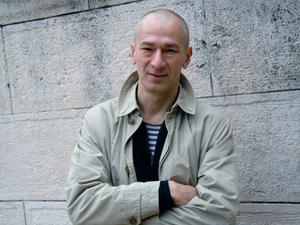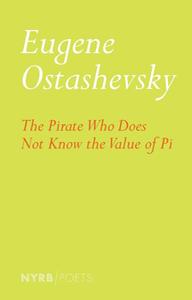
|
|
| photo: Natacha Nisic | |
Eugene Ostashevsky is the author of The Pirate Who Does Not Know the Value of Pi (New York Review Books, March 14, 2017), a poetry book about communication challenges affecting pirate-parrot relationships, and of The Life and Opinions of DJ Spinoza, a poetry book about rationalism. He also translated The Fire Horse: Children's Poems by Mayakovsky and Mandelstam and Kharms and Alexander Vvedensky's An Invitation for Me to Think, winner of the National Translation Award.
On your nightstand now:
I am now reading the proofs of Subsisters by the German poet Uljana Wolf, a bilingual edition with translations by Sophie Seita. I love language play, play between languages, and that's what Uljana does. Reflecting on her language as she writes--making her words mean double and sideways--lets her articulate things that are usually given to silence. And the translation is very inventive and smart also. It's going to be published by Belladonna, a feminist poetry press in New York.
Favorite book when you were a child:
I was a child in Russia, in Petersburg (or rather in Leningrad, USSR), in the '70s. My mother would read me Kun's Legends and Myths of Ancient Greece. It was a heavy, old-fashioned volume with a ponderous Stalinist cover and illustrated on the inside with statues and vases that later, as an adult, I would recognize in the Vatican and the Louvre. Kun made me obsessed with the Greeks. I first read a full translation of the Iliad when I was eight or nine. Now I teach it, and I also teach other books I read at that age, so I guess they stunted my growth.
Your top five authors:
I love Rabelais because he has no idea what he is going to write when he starts writing. He makes stuff up as he goes along. He is perfectly fine with inconsistencies in characters and plot. I've learned from him that, if one of my characters drops dead and then reappears two poems later with no explanation, it's fine. I love Shakespeare and John Webster even more, but who doesn't? In general my tastes are still very Russian. Rabelais's Gargantua and Pantagruel was a children's book in Russia, the same with Don Quixote. But they were also touted by the Russian avant-garde because they did not conform to the conventions of psychological realism. So the Russian writers I value most and that I translated--Daniil Kharms, Alexander Vvedensky, Nikolai Zabolotsky--that's the kind of material they admired, and Zabolotsky even translated Rabelais. The world is nonlinear, why should literature be linear? Book you're an evangelist for:
Book you're an evangelist for:
My deepest reading experience in the past two years is Katja Petrowskaja's Maybe Esther, a bestseller in Germany that is about to come out in English translation from HarperCollins. The author, who lives in Berlin, intended to write a memoir about her family in Kiev, but she wound up with an astonishing, eloquent and moving book about the traumas of the 20th century in that part of the world: of Stalinism, of the wars, especially World War II, and of the Holocaust. It's a book about language, and memory, and about putting on someone else's language while, incongruously, retaining your own memory that was formed by a different language and by a reality other to the one surrounding you now. I am not from Kiev, but I also grew up in the shadow of World War II. I read children's books about the blockade of Leningrad, I knew how much daily bread the members of each social group received. And now I also live in Berlin, in one of the Jewish neighborhoods where every building commemorates those deported from it. So Katja's book showed me how to own all that. But I also love her language. It is so polyphonic, she writes in German while thinking of words in Russian or English or other languages. Yet at the same time she does these complicated things very simply and very accessibly.
Another book I've been recommending left and right is Aneta Pavlenko's The Bilingual Mind, which is about, to simplify matters tremendously, why bilinguals believe they are different people in different languages.
Book that changed your life:
I can talk about a poem that changed my life. One day in my 20s, I was lying in my parents' basement and leafing through an old Oxford Book of English Verse, compiled by Helen Gardner. And there I came across Edward Lear's "The Owl and the Pussycat." I didn't know it as a child because it hadn't been translated. It was a shock. I read it over and over. It felt like the only real poem in there, the only poem completely devoid of verbiage. And I'm including Milton and Donne and so on in the comparison. Today "The Owl and the Pussycat" could become anthemic, like "The Road Not Taken," because it talks about love without imposing gender stereotypes or even differences. But it has the word "pussy." Americans get really nervous if they have to say "pussy" around children. They think they will be thought perverts. My mom bought my daughter Una a bowl with the text of "The Owl and the Pussycat" printed around the rim, but they excised "O lovely pussy, o pussy my love!/ What a beautiful pussy you are." They just left it out. They were scared. We own a bowdlerized bowl.
Favorite line from a book:
Una keeps asking me to tell her stories, so one day I just started retelling her the Divine Comedy--I teach it, so it's in my head, but also she was born in Florence. The Divine Comedy is great for children. It can be told in installments, and it also lends itself to adaptation into, basically, "Dante and his Friend Virgil go to the Center of the Earth and Play with Dead People." And I alter details to make it more relevant to her. So when the Dante of the original crosses the frozen lake at the bottom of hell, he comes across two brothers who fought each other, and are now encased in ice with other people who betrayed family members. But I had Dante and Virgil go skating on the ice, and the dysfunctional siblings whose heads they stumbled over are Anna and Elsa from Frozen. I also tell her about how little Dante first met little Beatrice outside the gelateria off Ponte Santa Trinita, and the kind of gelato they ate--she had nine scoops!
Anyway, I deal with the Divine Comedy a lot, even outside class. And my favorite line ever is from the Purgatorio. Virgil, who has taken Dante through hell and up Mount Purgatory, is not allowed to go closer to God, because he is a pagan. Beatrice comes to take over. When Dante sees her, he is overwhelmed and blurts out, in Italian, the words that, in the Latin of the Aeneid, are Dido's: I recognize the signs of old fire, "conosco i segni de l'antica fiamma" in his case, "agnosco veteris vestigia flammae" in hers. (When Dido says it, it means "I know I am in love with Aeneas because I again feel what I felt with my late husband.") Dante quotes Virgil to Virgil but in his own language and applying to his own predicament--and then Dante turns to Virgil--but Virgil has vanished. He has returned to his place among the damned while Dante was panting over Beatrice. And Dante didn't even say goodbye to his teacher. Every time I read it, I get very emotional. It's as if that line sang to me personally about all the losses in my life but also about all the moments of recognition: the partial, dialogic rediscovery of what was lost forever in what came to be at hand.

